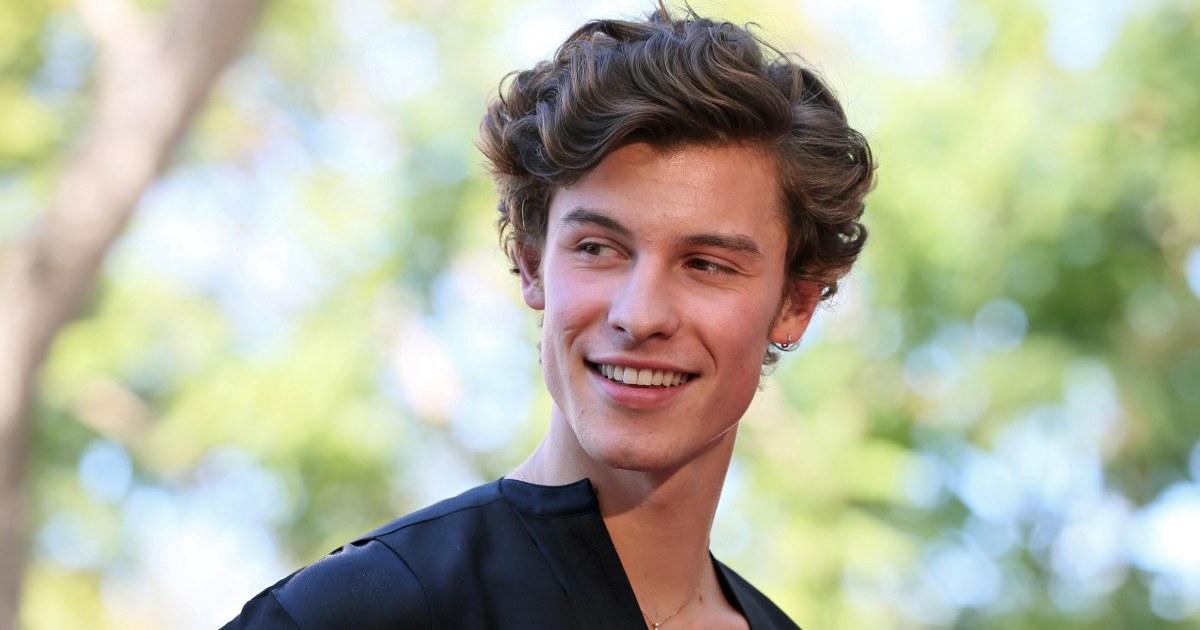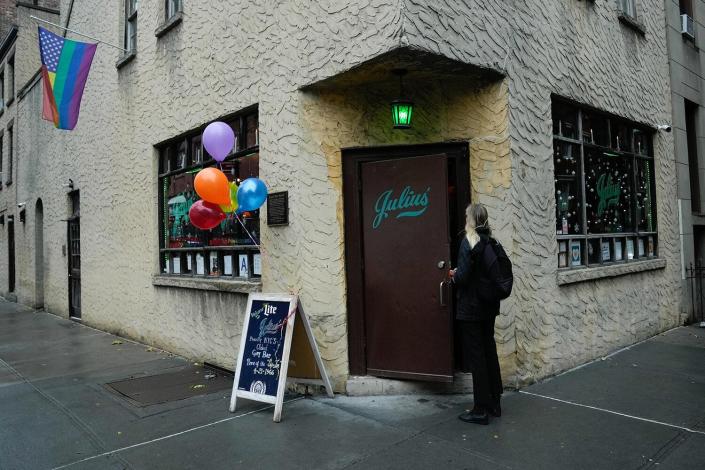
Pop stars Shawn Mendes and Camila Cabello announced last week that they are ending their two-year relationship, sending a meteorite crashing through the LGBTQ universe — or at least gay Twitter.
Mendes identifies as straight, but rumors have swirled about his sexuality for years. The topic is one of long-standing fascination within the queer community, and his breakup did little to quell gossipers and defenders alike.
Hundreds of users posted memes on social media in the past week, many of them joking about how gay men will be flocking to the heartthrob’s home now that he’s single. Google searches for “Shawn Mendes gay” hit a three-year peak last week as news of the couple’s split broke, dwarfing searches for Transgender Awareness Week, which landed at the same time.
“The gays rejoice,” a user wrote on Twitter.
But others said the rumors and the jokes were “gross.”
“are some of the shawn mendes gay jokes funny? yes. do they also remind me of that unspeakably awful, gut-punch feeling i’d get when i was closeted and someone TOLD me i was gay because i let the mask slip and acted feminine for one whole second? also yes,” gay social media influencer Matt Bernstein wrote on Twitter, garnering over 6,000 likes.
Mendes has not addressed the latest hearsay and did not reply to a request for comment. He has previously said the gossip is “frustrating.”
“You want to say, ‘I’m not gay but it’d be fine if I was gay — but also there’s nothing wrong with being gay but I’m not.’ You don’t really know how to respond to the situation,” he said in an interview on Dax Shepard’s podcast, “Armchair Expert,” last year.
Mendes is not the only celebrity who has been subjected to the rumor mill. Oprah Winfrey, Tom Cruise, Hillary Clinton and Hugh Jackman — all self-identified heterosexuals — are just some of the public figures who have had their turns.
For years, the close friendship between Winfrey and CBS host Gayle King sparked rumors that the two were a couple. In 2010, Winfrey told ABC News’ Barbara Walters, “I’m not a lesbian … I’m not even kind of a lesbian.”
“The reason why it irritates me is because it means that somebody must think I’m lying. That’s number one,” she said. “Number two … Why would you want to hide it? That is not the way I run my life.”
But while speculation about sexuality among gay friends has existed as long as gay people have, when the speculation moves to a public forum, it can be damaging, some experts say.
Dr. Jack Drescher, a clinical professor of psychiatry at Columbia University and the author of “Psychoanalytic Therapy and the Gay Man,” said such speculation can be particularly damaging if the subject is actually gay and is not ready to come out on their own terms.
“If it actually is true that they might be gay and people are speculating about it, you’re going to sort of make them feel threatened and endangered,” Drescher said, stressing that he was speaking hypothetically and not about a specific public figure. “Even though he may like getting his name in the newspaper and people talking about him, there would be a part of him that would be very, very anxious by all the talk. There would be no way a person wouldn’t be made anxious by all of this talk if they didn’t want people to know this about themselves.”
‘Gaydar’ vs. ‘wishdar’
LGBTQ sex-columnist and podcaster Dan Savage sees it a bit differently from Drescher.
“Sometimes it’s hard for gay men to separate their ‘gaydar’ from their ‘wishdar,’” Savage said. “There’s not a lot of speculation in the gay community that Louis C.K. must be gay. When I was growing up, Tom Cruise was who everyone speculated about, and now it’s Shawn Mendes, because we all wish he would be.”
Savage said that harmful or not, such speculation is inevitable.
“You can slap the ‘this is potentially harmful’ label on it and people are still going to do it,” he said. “We’re all assumed to be straight, and there’s a time in all of our lives when we’re saying we’re straight when we’re not because we were forced to say that. So we look at other people who are currently saying that, and we know that there is a significant percentage of them who are lying like we did when we were kids.”
Collateral damage
High-profile speculation and outings — particularly if they are of the unkind variety — could harm more than just the subjects of the rumors. Kevin Wong, the vice president of communications for the Trevor Project, an LGBTQ youth suicide prevention and crisis intervention organization, said it could be “incredibly invalidating” for LGBTQ youths in particular.
“If you were thinking about coming out and you see something occurring on a world stage where people are being mean-spirited about somebody else’s potential sexual orientation or speculating about somebody’s gender identity, you’re going to internalize that,” Wong said. “That will make you feel ashamed. That will ascribe stigma to how you feel about yourself and your identities.”
Wong pointed to the disproportionate rates of bullying, harassment, mental health issues and suicidal thoughts plaguing LGBTQ youths. A study this year by the Trevor Project found that more than 52 percent of LGBTQ middle and high schoolers reported having been bullied in person or online. In a separate survey this year, the Trevor Project found that 42 percent of LGBTQ youths have seriously considered suicide within the last year. Over 34,000 LGBTQ youths were surveyed for both studies.
“Anyone who is using their platform or their language to bully or harass someone around sexual orientation or gender identity, they’re contributing to that,” Wong said.
Clinton Anderson, the American Psychological Association’s acting chief of psychology in the public interest, compared the high-profile speculation around celebrities and politicians to the media coverage of Rutgers University freshman Tyler Clementi’s suicide in 2010.
Clementi, who was out to only a small circle of family and friends, died by suicide after he learned that his roommate had secretly recorded him having a romantic encounter with a man.
“Kids reading about that associate being exposed with killing yourself,” Anderson said. “That’s not a good association or message for a young person who is himself struggling with the kind of situation that that young man was in.”
Is outing ever justified?
Not all speculation or outing in public forums is created equally, said Mike Rogers, who made a career outing elected officials in his former blog, BlogActive. Rogers’ reporting, which focused on outing elected officials who actively worked against LGBTQ rights, was the subject of the Oscar-nominated documentary “Outrage.”
Rogers recalled seeing firsthand a man perform a sex act on another man “the same day that his boss, George W. Bush, introduced the Federal Marriage Amendment,” Rogers said, referring to a proposed amendment to the Constitution in 2004 that would have banned same-sex marriage.
“That’s just unacceptable to me,” he said.
As for the speculation surrounding Mendes, Rogers said: “My first question would be, ‘What has he done that is anti-gay?’ And if you can’t give me anything, I’m not interested in the story.”
Anti-gay lawmakers aside, Savage said he empathizes with LGBTQ people who are angered by public figures who are, in fact, lesbian, gay, bisexual, transgender or queer and are not out.
“We’re not all 14 and in high school. If you’re in your 20s, 30s, 40s and you’re safe — emotionally, you can’t be retaliated against by your family, professionally — and you’re not out, I think that’s a moral failing,” Savage said. “But still, we all hated this when people speculated about us before we were out. And then once we’re out, we all do it. What is up with that?”








